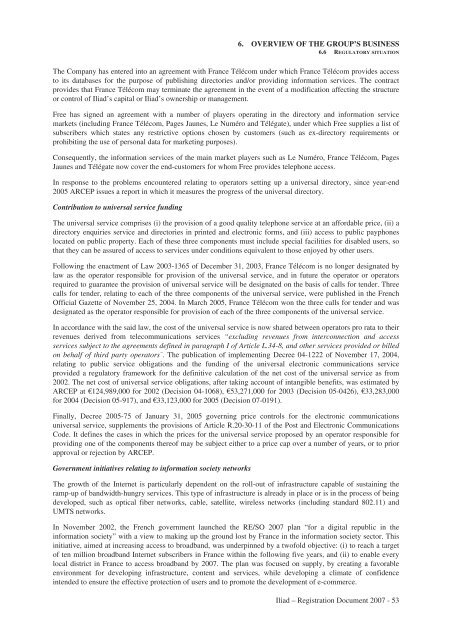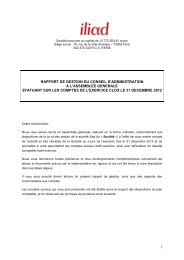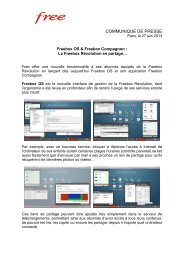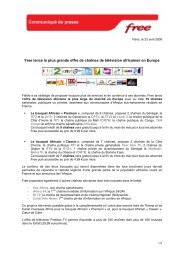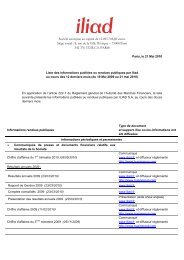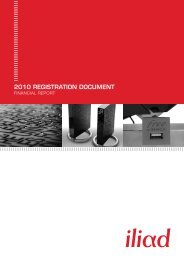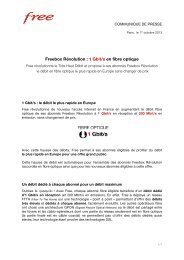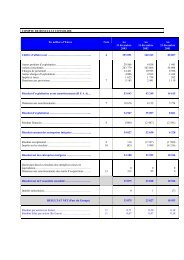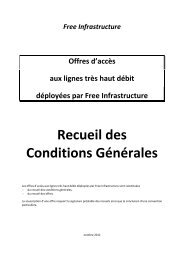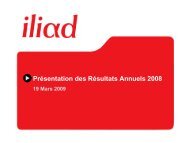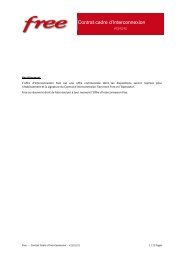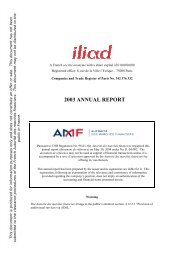REGISTRATION DOCUMENT AND FINANCIAL REPORT - Iliad
REGISTRATION DOCUMENT AND FINANCIAL REPORT - Iliad
REGISTRATION DOCUMENT AND FINANCIAL REPORT - Iliad
- TAGS
- registration
- iliad
- iliad.fr
You also want an ePaper? Increase the reach of your titles
YUMPU automatically turns print PDFs into web optimized ePapers that Google loves.
6. OVERVIEW OF THE GROUP’S BUSINESS<br />
6.6 REGULATORY SITUATION<br />
The Company has entered into an agreement with France Télécom under which France Télécom provides access<br />
to its databases for the purpose of publishing directories and/or providing information services. The contract<br />
provides that France Télécom may terminate the agreement in the event of a modification affecting the structure<br />
or control of <strong>Iliad</strong>’s capital or <strong>Iliad</strong>’s ownership or management.<br />
Free has signed an agreement with a number of players operating in the directory and information service<br />
markets (including France Télécom, Pages Jaunes, Le Numéro and Télégate), under which Free supplies a list of<br />
subscribers which states any restrictive options chosen by customers (such as ex-directory requirements or<br />
prohibiting the use of personal data for marketing purposes).<br />
Consequently, the information services of the main market players such as Le Numéro, France Télécom, Pages<br />
Jaunes and Télégate now cover the end-customers for whom Free provides telephone access.<br />
In response to the problems encountered relating to operators setting up a universal directory, since year-end<br />
2005 ARCEP issues a report in which it measures the progress of the universal directory.<br />
Contribution to universal service funding<br />
The universal service comprises (i) the provision of a good quality telephone service at an affordable price, (ii) a<br />
directory enquiries service and directories in printed and electronic forms, and (iii) access to public payphones<br />
located on public property. Each of these three components must include special facilities for disabled users, so<br />
that they can be assured of access to services under conditions equivalent to those enjoyed by other users.<br />
Following the enactment of Law 2003-1365 of December 31, 2003, France Télécom is no longer designated by<br />
law as the operator responsible for provision of the universal service, and in future the operator or operators<br />
required to guarantee the provision of universal service will be designated on the basis of calls for tender. Three<br />
calls for tender, relating to each of the three components of the universal service, were published in the French<br />
Official Gazette of November 25, 2004. In March 2005, France Télécom won the three calls for tender and was<br />
designated as the operator responsible for provision of each of the three components of the universal service.<br />
In accordance with the said law, the cost of the universal service is now shared between operators pro rata to their<br />
revenues derived from telecommunications services “excluding revenues from interconnection and access<br />
services subject to the agreements defined in paragraph I of Article L.34-8, and other services provided or billed<br />
on behalf of third party operators ” . The publication of implementing Decree 04-1222 of November 17, 2004,<br />
relating to public service obligations and the funding of the universal electronic communications service<br />
provided a regulatory framework for the definitive calculation of the net cost of the universal service as from<br />
2002. The net cost of universal service obligations, after taking account of intangible benefits, was estimated by<br />
ARCEP at €124,989,000 for 2002 (Decision 04-1068), €53,271,000 for 2003 (Decision 05-0426), €33,283,000<br />
for 2004 (Decision 05-917), and €33,123,000 for 2005 (Decision 07-0191).<br />
Finally, Decree 2005-75 of January 31, 2005 governing price controls for the electronic communications<br />
universal service, supplements the provisions of Article R.20-30-11 of the Post and Electronic Communications<br />
Code. It defines the cases in which the prices for the universal service proposed by an operator responsible for<br />
providing one of the components thereof may be subject either to a price cap over a number of years, or to prior<br />
approval or rejection by ARCEP.<br />
Government initiatives relating to information society networks<br />
The growth of the Internet is particularly dependent on the roll-out of infrastructure capable of sustaining the<br />
ramp-up of bandwidth-hungry services. This type of infrastructure is already in place or is in the process of being<br />
developed, such as optical fiber networks, cable, satellite, wireless networks (including standard 802.11) and<br />
UMTS networks.<br />
In November 2002, the French government launched the RE/SO 2007 plan “for a digital republic in the<br />
information society” with a view to making up the ground lost by France in the information society sector. This<br />
initiative, aimed at increasing access to broadband, was underpinned by a twofold objective: (i) to reach a target<br />
of ten million broadband Internet subscribers in France within the following five years, and (ii) to enable every<br />
local district in France to access broadband by 2007. The plan was focused on supply, by creating a favorable<br />
environment for developing infrastructure, content and services, while developing a climate of confidence<br />
intended to ensure the effective protection of users and to promote the development of e-commerce.<br />
<strong>Iliad</strong> – Registration Document 2007 - 53


